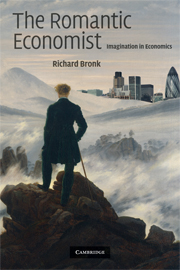Preface
Published online by Cambridge University Press: 05 March 2015
Summary
Our understanding of the world is structured and limited by the language and metaphors we use. Each individual's vision is partly socially constructed by shared frameworks of interpretation; but it is also the product of particular life-experiences and an imaginative capacity to invent new perspectives.
The Romantic Economist is inevitably shaped by my background, which has given me a somewhat unusual combination of perspectives on the great discipline of economics. For much of the last eight years, I have been privileged to work at the London School of Economics and Political Science, teaching postgraduate courses in applied and theoretical political economy — the sister discipline of economics. My own university training was, however, in philosophy and classical literature. Despite or because of that, I spent the first seventeen years of my career in international finance — as a pension fund manager and subsequently an adviser at two investment banks and the Bank of England on European Monetary Union and supply-side reform in Europe. While in the City of London, I was lucky enough to have access to many of the best and brightest in the economics profession. I also gained an insight into what motivates entrepreneurs and structures the behaviour of operators in financial markets. At the same time, I retained a strong interest in philosophy and literature, and became especially fascinated by the Romantic thinkers and poets who wrote around two centuries ago.
- Type
- Chapter
- Information
- The Romantic EconomistImagination in Economics, pp. xi - xvPublisher: Cambridge University PressPrint publication year: 2009

